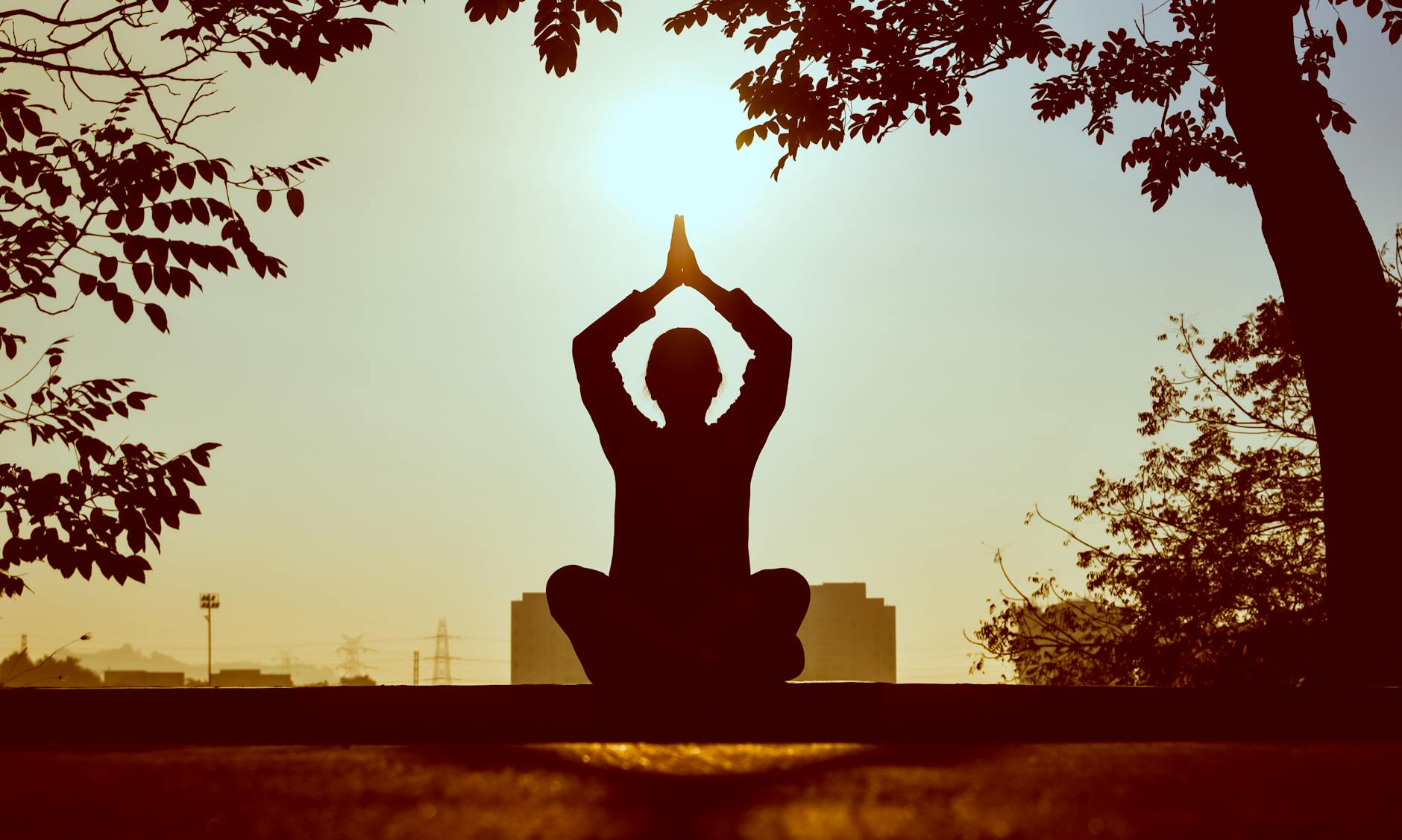
Meditation has been an integral part of Indian culture for centuries, deeply rooted in traditions and spiritual practices. In today’s fast-paced world, the ancient art of meditation offers a refuge of tranquility amidst the chaos. This blog post is designed for culturally conscious Indians, aged 25-60, seeking authentic practices to incorporate into their modern lives.
Understanding Meditation: A Journey of Inner Peace
Meditation is a practice where you train your attention and awareness, using techniques like mindfulness or focusing your mind on a specific object, thought, or activity. This practice has deep roots in Indian culture, with references found in ancient texts like the Vedas and Upanishads.
- Historical Significance: Meditation has been practiced in India for thousands of years. Texts like the Vedas and Upanishads detail various meditation techniques.
- Types of Meditation: Popular practices include Vipassana, Transcendental Meditation, and Yoga Nidra.
- Key Terms:
- Mindfulness: Being fully present in the current moment, without judgment.
- Mantra: A word or sound repeated to aid concentration.
- Pranayama: Breath control exercises.
- Scientific Benefits: Studies demonstrate that meditation improves brain function, reduces stress, and enhances overall health.
- Common Misconceptions: Meditation isn’t just for the spiritually inclined; it benefits everyone.
Meditation offers mental and emotional benefits such as stress relief, improved concentration, and emotional stability. Even with a busy lifestyle, meditation can be easily integrated into daily routines.
Breathing Techniques: The Foundation of Calm
Controlled breathing exercises are a simple and effective way to begin your meditation journey. These techniques help center your mind and reduce stress.
- Pranayama: An ancient practice described in Patanjali’s Yoga Sutras.
- Anulom Vilom (Alternate Nostril Breathing): Balances the mind and enhances oxygen flow.
- Bhramari (Bee Breath): Provides instant calm and mental clarity.
- Kapalbhati (Skull Shining Breath): Detoxifies and energizes the body.
Steps for Anulom Vilom:
- Sit comfortably with a straight back.
- Close your right nostril with your thumb.
- Inhale deeply through your left nostril.
- Close your left nostril with your ring finger.
- Exhale through your right nostril.
- Inhale through your right nostril, close it, and exhale through your left nostril.
- Repeat for 5-10 minutes.
Practicing these breathing techniques can improve lung function and reduce anxiety.
Mindfulness Meditation: Being Present in the Moment
Mindfulness meditation focuses on being present in the moment, observing thoughts and sensations without judgment.
- Concept of Being Present: Mindfulness involves being fully engaged in the here and now.
- Origins: Rooted in Buddhist practices, mindfulness is now part of modern wellness routines.
- Beginner Guide: Find a quiet space, sit comfortably, close your eyes, and focus on your breath. Notice each inhale and exhale.
- Body Scan Technique: Pay attention to different parts of your body, starting from your toes to your head.
Mindfulness improves emotional regulation and reduces stress. It also enhances personal relationships by promoting empathy.
Mantra Meditation: Finding Peace Through Repetition
Mantra meditation involves repeating a word or phrase to aid concentration. This practice is deeply rooted in Indian spiritual traditions.
- Significance of Mantras: Mantras hold spiritual power in Hindu and Buddhist practices.
- Choosing a Mantra: Select a meaningful word like ‘Om’ or ‘So Hum.’
- Practice Guide: Sit comfortably, close your eyes, and repeat the mantra softly or silently for 10-20 minutes.
Mantra meditation increases concentration and brings a deeper sense of peace.
Guided Meditation: A Gentle Introduction
Guided meditation involves following along with a recorded voice or teacher. It is an accessible option for beginners.
- What It Is: A guide leads you through the meditation process.
- Benefits: Provides structure and ease of practice for beginners.
- Themes: Relaxation, sleep, stress relief.
Setting intentions before starting can make guided meditation more effective.
Creating a Meditation Space: Your Sanctuary of Calm
A dedicated space for meditation enhances the practice and helps establish a routine.
- Tranquil Environment: A peaceful, clutter-free space aids focus.
- Home Tips: Use soft lighting, gentle sounds, and pleasant scents like incense or essential oils.
- Traditional Elements: Incorporate items like diyas, sacred symbols, or plants.
- Comfortable Seating: Use a cushion or mat for comfort.
A dedicated space can positively impact consistency and commitment to meditation.
Enhance Your Meditation Experience with Premium Dhoop Sticks from Poojn.in
Meditation techniques for beginners often focus on calming the mind and creating a serene environment. Poojn.in offers premium quality bamboo-less dhoop sticks that can enhance your meditation experience.
Benefits of Our Dhoop Sticks
- Bakhoor: Soothes the mind and spirit, helping you achieve a deeper state of meditation.
- Mogra: Elevates mood and promotes relaxation, making it easier to focus during meditation.
- Lavender: Reduces stress and induces calmness, providing a peaceful atmosphere for your practice.
Eco-Friendly:
Our bamboo-less design is environmentally friendly, producing less waste and a cleaner burn compared to traditional incense sticks. This eco-conscious choice reflects our commitment to sustainability and your well-being.
Versatile Use:
Perfect for meditation, yoga, prayers, or simply to create a pleasant atmosphere in your living spaces. The harmonious blend of scents is suitable for any setting, enhancing the overall ambiance and making your environment more inviting.
Thoughtful Gift:
Beautifully packaged, these dhoop sticks make an ideal gift for loved ones. Whether for festivals, housewarmings, or any special occasion, they are a thoughtful gesture that shows care and consideration.
How to Use:
- Place the dhoop stick in the stand provided.
- Light the tip of the stick and let it burn for a few seconds.
- Gently blow out the flame, allowing the stick to smolder and release its aromatic smoke.
- Enjoy the soothing fragrance as it permeates your space, creating a serene and relaxing atmosphere.
Elevate your spiritual practices and daily routines with the enchanting aromas of Premium Quality Bamboo Less 80 mm Long Dhoop Sticks With Stand By S.F Manufacturing available at Poojn.in.
Embrace the Calm
Meditation invites serenity into our hectic lives. By embracing these simple techniques, you honor a rich tradition while nurturing your well-being. Start small, be consistent, and soon, meditation will become a cherished part of your daily routine. Whether through mindful breathing, repeating mantras, or guided sessions, you will discover a profound sense of calm and clarity. Create your tranquil space and let the ancient wisdom of meditation enrich your modern life. Remember, the journey to inner peace begins with a single, mindful breath.
Meditation for Beginners: Frequently Asked Questions
What is meditation?
Meditation is a practice where you focus your mind on a particular object, thought, or activity to achieve a mentally clear and emotionally calm state.
Why should beginners meditate?
Beginners should meditate to reduce stress, improve focus, and enhance overall well-being. It helps calm the mind and brings inner peace.
How long should a beginner meditate each day?
A beginner can start with 5-10 minutes each day and gradually increase the time as they become more comfortable with the practice.
What is the best time to meditate?
The best time to meditate is when you feel most relaxed. Many people prefer to meditate in the morning to start their day calmly.
Do I need any special equipment to meditate?
No, you don’t need any special equipment to meditate. A quiet place and a comfortable seat are enough. Some people use cushions or mats for added comfort.
What are some easy meditation techniques for beginners?
Some easy meditation techniques for beginners include focusing on your breath, using guided meditations, or repeating a mantra.
Can meditation help with anxiety?
Yes, meditation can help reduce anxiety by calming the mind and helping you focus on the present moment. Regular practice can lead to long-term benefits.
Is it normal to get distracted during meditation?
Yes, it is normal to get distracted during meditation, especially for beginners. When you notice your mind wandering, gently bring your focus back to your breath or mantra.


